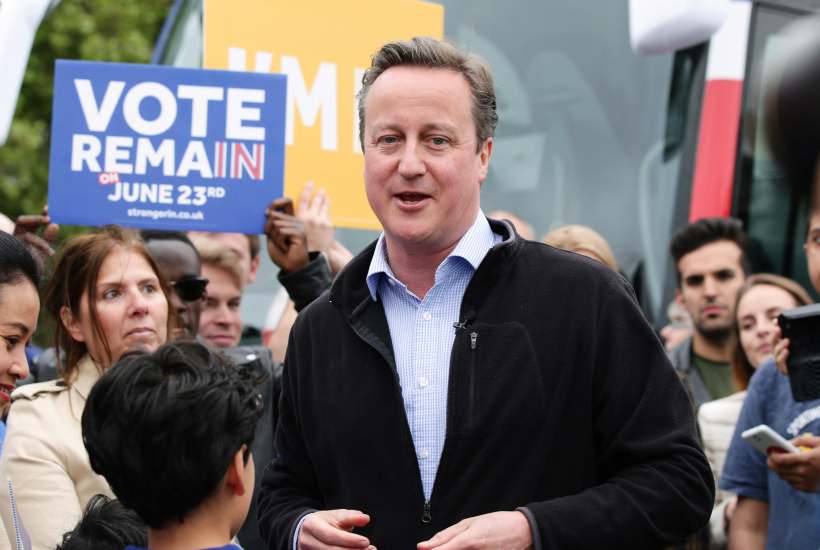It was a famous American editor and columnist Michael Kinsley who once defined the political ‘gaffe’ as something that occurs when a politician tells the truth; and he was right, for it is usually the case that a person gets into most trouble when he publicly says what he actually believes. There were a couple of examples just the other day — one when the Queen said that Chinese officials had been ‘very rude’ to a British ambassador during a visit to London, and the other, even more embarrassing, when David Cameron described Nigeria and Afghanistan as ‘fantastically corrupt countries’. They had both been overheard while chatting with guests at a Buckingham Palace garden party and were the most recent victims of a now frequent danger facing public figures — the forgotten camera or mistakenly left-on microphone. It was one such that so damaged Gordon Brown during the 2010 general election when it picked him up describing an amiable elderly voter in Rochdale as a ‘bigoted woman’.
Such gaffes are, of course, seldom committed on purpose. Politicians don’t look for trouble. But gaffes can come from anywhere. An especially delightful one occurred during President Bush’s visit to Japan for a G8 summit in 2008. A press pack handed out by the White House to correspondents travelling with Bush contained potted biographies of the other world leaders he would meet there; and the one for the Italian prime minister, Silvio Berlusconi, called him ‘one of the most controversial leaders in the history of a country known for governmental corruption and vice’ and ‘a political dilettante who gained office only through his considerable influence on the national media’ — all this about a statesman who had been an unswerving supporter of Bush over Iraq. This particular truth-telling had been nothing more than lazy incompetence by White House staff, who had simply copied Berlusconi’s profile from a website called ‘the Encyclopaedia of World Biography’.
So far, however, the EU referendum campaign has been mercifully spared all gaffes, for all involved in the debate have been very careful to avoid the truth. Indeed, they have so doggedly stuck to lies that they have been condemned by the House of Commons Treasury Select Committee for peddling ‘misleading’ figures and ‘implausible assumptions’. ‘What we really need is an end to the arms race of ever more lurid claims and counter-claims made by both sides,’ says Andrew Tyrie, the committee chairman.
The claims range from a long recession, massive unemployment and a slump in house prices, by the government, to a huge rise of immigration, despoliation of the English countryside and a vast increase of terrorism, by the Brexit people. What nobody on either side will confess is that he doesn’t actually know what the consequences of Britain leaving the European Union would mean. Boris Johnson was said to have suffered long, anguished indecision about whether to join the Remain or Leave campaign. How, then, can he now be certain that to remain in the EU would be for Britain an unmitigated disaster? He doesn’t seem plausible when he says so.
The biggest gaffe for anyone, however, would be to admit that he doesn’t know what Brexit would mean. It would only confuse and irritate the electorate. It would also undermine Brexit’s case, which is difficult to make as it is. The Remainers have to their advantage that they are advocating the status quo. To add threats of doom to Brexit can only help them. Priti Patel may be right to accuse the Prime Minister and his allies of ‘concocting Armageddon scenarios’, but it’s still a sensible policy. Scaremongering is his best chance of winning the referendum.
As for Brexit, Charles Moore put the only real reason for it in his Daily Telegraph column last Monday: it was to choose freedom from the shackles of Brussels. ‘If you like the sense of being distantly ruled by people over whom you have no power, vote Remain!’ he wrote. The question is how many people really feel like that. It is even to what extent we actually are ruled in such a way. The outcome will give the answer to that first question. But Charles may at last have committed what Kinsley would have called a gaffe.
Got something to add? Join the discussion and comment below.
Get 10 issues for just $10
Subscribe to The Spectator Australia today for the next 10 magazine issues, plus full online access, for just $10.













Comments
Don't miss out
Join the conversation with other Spectator Australia readers. Subscribe to leave a comment.
SUBSCRIBEAlready a subscriber? Log in